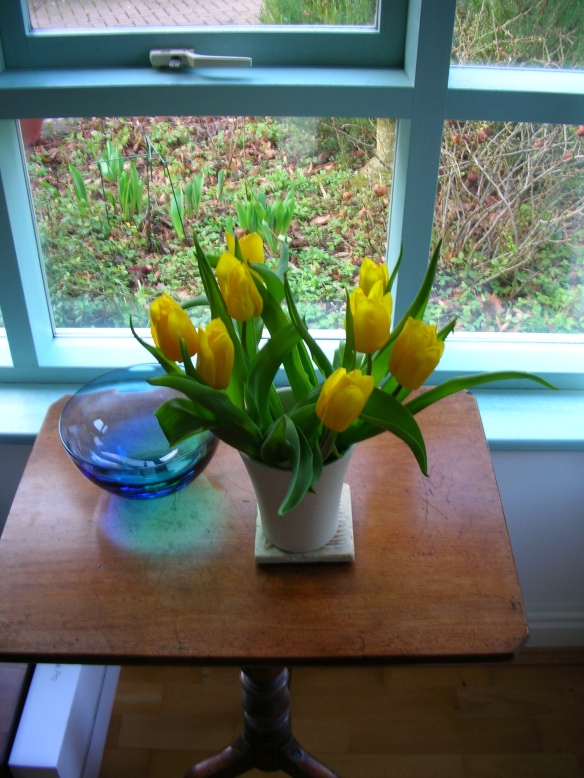Dear all, I gather that the lines of poetry are showing incorrectly in some browsers. I can’t correct them as they are fine in mine – so sorry.
This is a transcript of a speech I made at Toastmasters (where I am learning about public speaking). I don’t know if it will work as a post, but I know many of you will miss Cynthia Jobin as much as I do. The speech was restricted to between 5 and 7 minutes and was about using language clearly, simply and directly. Several members of the audience did not have English as a first language and for some of them poetry was an unknown pleasure.
I was so determined to have 6 tulips in flower, that I slightly overdid it. 

Poetry delights me. And for the next few minutes I’d like to show you just a few of the ways in which it does so.
In a poem called The Storm, Walter de la Mare starts
First there were two of us, then there were three of us, Then there was one bird more, Four of us–wild white sea-birds, Treading the ocean floor; And the wind rose, and the sea rose, To the angry billows roar
The storm and the birds keeps on growing until there is:
A host of screeching, scolding, scrabbling sea-birds on the shore.
And then he brings the birds and the storm gently to rest.
A snowy, silent, sun-washed drift of sea-birds on the shore.
Using words that sound like the story they’re telling, is perhaps the most familiar delight of poetry, but poems can work in a thousand different ways. They can, for instance, simply send a message. Here is one from William Carlos Williams.
This is Just to Say
I have eaten the plums that were in the icebox
and which you were probably saving for breakfast
Forgive me they were delicious so sweet and so cold
It reads like a post-it note, yet it’s also a tiny, unforgettable love-letter.
***
Lots of poems deal with universal subjects – the trials of love and the anguish of grief – and we can go to them for comfort. But what if you want to convey an experience that will be unknown to most of your readers? The C17th poet, Milton, was going blind, so he used the voice of the blinded biblical figure, Samson, to convey his terror:
Dark, dark, dark, amid the blaze of noon, Irrecoverably dark, total eclipse, beyond all hope of light.
You may, I trust, never experience blindness, but I defy you to forget the passion and the beat of that cry – Dark, dark, dark, amid the blaze of noon.
***
Poets love metaphors. So if I say: ‘it’s raining cats and dogs’ you know I don’t mean it literally but you understand me – your imagination stretches and your brain enjoys that! T S Eliot made London fog vivid for us by making it behave like a cat.
The yellow fog that rubs its back upon the window-panes, Licked its tongue into the corners of the evening… Slipped by the terrace, made a sudden leap, And seeing that it was a soft October night Curled once about the house, and fell asleep.
***
A particular delight for me in poetry is the layers of ideas. So you get two, or even three or four, for one. Here are a couple of simple lines by Alun Lewis [from Raider’s Dawn] written in WWII.
Softly the civilised centuries fall, Paper on paper, Peter on Paul
Lewis shows how both individual people and the long-term efforts of humanity are lost through war. Choosing Biblical names, Peter and Paul, reminds us that war is against the principles of Christianity (and most other religions). He points a finger at bureaucracy – paper on paper – because bureaucrats run wars. He has skilfully made one verb – to fall – do the work for all three ideas and at the same time he has seduced our ears with the alliteration – the repeated opening sounds – softly, civilised, centuries; paper, Peter and Paul.
***
Another thing poetry can do is make us feel understood. Little story – my brother was out on a walk with fellow ramblers, when the person beside him (a stranger) looked at a green shoot appearing out of the ground and quoted:
When I went out The sun was hot It shone upon My flower pot.
And there I saw A spike of green That no one else Had ever seen! [at this point my brother joined in]
On other days The things I see Are mostly old Except for me.
But this green spike So new and small Had never yet Been seen at all!
This poem was written by my grandmother in the 1930s and still appeals to small children today.
***
I want to dedicate this talk to an American poet, Cynthia Jobin, who died just before Christmas. Her writing is moving, scholarly, often funny, and to me utterly delightful. So here are the last three lines of a poem titled, Six Yellow Tulips:
Only being is a tulip’s work. Being beauty against gloom. After a long winter being the yellowest, gladdest thing in the room.


